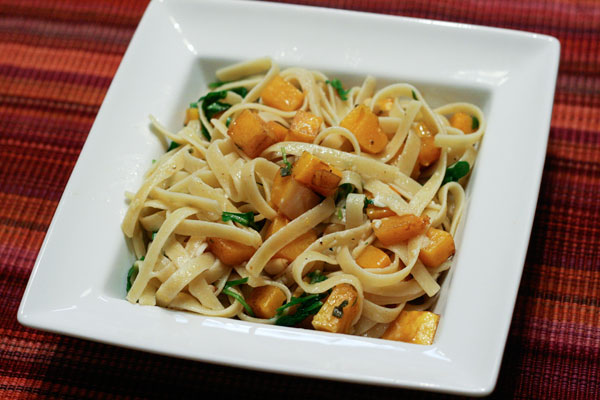This recipe comes from Cooking Light, and it’s so simple you’re going to wonder why you didn’t think of it yourself.
Simply roast butternut squash with balsamic vinegar, then toss it with fettuccine, pine nuts, chopped fresh sage, arugula, and Parmesan cheese.
Without really trying to, we’ve been eating a lot of vegetarian meals lately, like pear ravioli and Moroccan vegetable stew. But we still eat meat. We’re young, we’re active, we’re healthy, and we believe in eating everything in moderation — from braised beef and roasted pork to peanut butter ice cream and Cheddar cheese to spinach and blueberries. Which is why we were very interested to see the local premier of Forks Over Knives on Wednesday night.
The documentary is based on the book, The China Study, and it discusses the potential of a plant-based diet (a.k.a. vegan) to control and even cure diseases like cancer and diabetes. Here’s the trailer:
The experts in the film say that cancer cells are “turned on” by animal proteins (including milk and eggs), and that we should eliminate them from our diets. They had quite a bit of evidence to back up their claims, and the real-life stories were pretty remarkable, though we’re still skeptical.
I’m working on a story for WPSU-FM, so I’ll share more details when my piece airs. But I’m curious. Have you heard of the book or the film? What do you think?
Fettuccine with Squash, Arugula, and Pine Nuts
servings: 6
Ingredients
- 1 butternut squash, peeled and cubed
- 2 Tbsp balsamic vinegar
- 2 tsp olive oil
- 1/2 tsp salt, divided
- 8 oz fettuccine
- 1 Tbsp butter
- 2 Tbsp pine nuts
- 1 Tbsp chopped fresh sage
- 2 cloves garlic, minced
- 2 cups trimmed arugula
- 1/2 cup Parmesan cheese
- 1/2 tsp ground black pepper
Directions
- Preheat oven to 475°.
- Combine squash, vinegar, oil, and 1/4 tsp salt in a large bowl; toss to coat. Arrange in single layer on rimmed baking sheet coated with cooking spray. Bake for 25 minutes until tender, stirring occasionally.
- Meanwhile, cook pasta according to package directions (but without salt or oil). Drain and reserve 1 Tbsp cooking liquid.
- Melt butter in large skillet over medium heat. Add pine nuts, sage, and garlic. Cook for 3 minutes until pine nuts begin to brown.
- In a large bowl, combine pasta with reserved cooking liquid, pine nuts mixture, and squash; toss gently. Add remaining 1/4 tsp salt, arugula, cheese, and black pepper; toss again. Serve immediately.
(adapted from Cooking Light)


I’ve heard of the film and I’m very interested to see it – as well as to read your thoughts! {Without having done much research on this particular theory} I agree whole-heartedly that they typical American’s diets is a HUGE factor in the health of our country’s population. However, people have been eating meat and animal products for a very, very long time… I’m apt to believe the QUANTITY (both portion size and ration of meat + diary to produce, etc) and the QUALITY (how it’s produced, how it’s processed, etc) is the greater variable. I think America’s health problems require a solution much more complex than “eat a vegan diet.”
That being said, I’ve been having a lot of fun lately serving up some vegetarian meals… most of them are so delicious, Evan doesn’t even notice they don’t contain meat! {Southern Falafel comes to mind!}
that should be *ratio* not ration. Doh.
I wanted to see the showing of that film the other day so badly, but it’s difficult for me to be in town that late when I live so far away =/ Can’t wait to hear more about it, though.
I had not heard about the film or the book, but coincidentally I discussed the matter with a friend this afternoon. She is studying medicine and will soon be a specialist in internal medicine. We both declared that we do not eat meat too often, but do not plan to cut it out all the way. I read books like Eating Animals and watch documentaries about the food market in Europe, my friend has the scientific background and we agreed that not the meat, milk or egg itself is the problem, put how we raise, treat and sell the product. Besides, Carsten and I often talk food and evolution matters over breakfast on Saturday mornings and can tell how friends of ours, who don’t eat meat, are less resilient. Ultimately, the point for us is to try as much as possible to find out where our food comes from and buy locally. I respect other opinions, but believe that it is not a black and white topic. It’s simply not as easy as that. Sorry for the rambling…
I hadn’t heard of the film before Anna’s post but it definitely sounds intriguing and it would be interesting to hear the counterarguments as well. Regarldess, I am a meat eater who is making a conscious effort to eat more ‘plants’ and agree whole heartedly in the everything-in-moderation approach. That means everything. Chocolate. Wine. Raddichio. And steak.
Thanks for the insightful comments, ladies! Sounds like we’re all of the everything-in-moderation mindset.
I made this recipe last night. It was so easy and delish! Thanks!